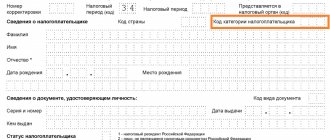What responsibilities do clause 1 of Art. provide for taxpayers? 23 of the Tax Code of the Russian Federation?
The main obligation for all taxpayers under Art. 23 of the Tax Code of the Russian Federation is the payment of taxes and insurance premiums (subclause 1, clause 1 and subclause 1, clause 3.4, article 23 of the Tax Code of the Russian Federation).
All taxpayers are registered with the tax authorities, each being assigned a separate TIN (taxpayer identification number) - both individuals and companies have it. The obligation to register in cases established by law is prescribed by subsection. 2 p. 1 art. 23 Tax Code of the Russian Federation.
Taxpayers must keep records of income received and objects subject to taxes (transport, real estate, land, etc.) and insurance premiums - this responsibility is assigned to them sub-clause. 3 clause 1 and sub. 2 clause 3.4 art. 23 Tax Code of the Russian Federation. It is also necessary to report to the tax authorities by submitting tax returns (subclause 4, clause 1, article 23 of the Tax Code of the Russian Federation), and calculations for insurance premiums (subclause 3, clause 3.4, article 23 of the Tax Code of the Russian Federation).
Subp. 5 p. 1 art. 23 of the Tax Code of the Russian Federation provides for the submission to the tax authority at the place of residence of an individual entrepreneur, a notary engaged in private practice, a lawyer who has established a law office, at the request of the tax authority, a book of income and expenses and business transactions.
If inspectors consider it necessary to request documents from the taxpayer containing information on how he calculated and paid taxes or contributions, these papers will have to be provided, since this obligation is provided for in subsection. 6 clause 1 and sub. 4 clause 3.4 art. 23 Tax Code of the Russian Federation. For payers of insurance premiums, a similar obligation is also provided for in terms of information on insured persons (subclause 5, clause 3.4, article 23 of the Tax Code of the Russian Federation).
If inspectors identify violations of the legislation on taxes and fees, the taxpayer is obliged to eliminate them and comply with all the requirements of the tax authorities, if they do not contradict the law (subclause 7, clause 1, article 23 of the Tax Code of the Russian Federation).
Another duty of the taxpayer is to preserve for 5 years accounting and tax documents containing information on how taxes are calculated and confirming their payment (subclause 8, clause 1, article 23 of the Tax Code of the Russian Federation). For insurance premiums, a similar period is set in a larger amount: it is equal to 6 years (subclause 6, clause 3.4, article 23 of the Tax Code of the Russian Federation).
Important! Recommendations from ConsultantPlus Legislation establishes storage periods for documents separately for tax accounting purposes and for accounting purposes. Since the same document may be required simultaneously for both tax and accounting purposes, both deadlines must be taken into account. We believe that if the storage periods for a certain document for tax purposes and for accounting purposes differ, it is worth focusing on a longer period. Next, we will consider the main legal acts regulating the storage periods of documents for tax and accounting purposes. Read more about document retention periods in K+. Trial access to the system is free.
In addition to those listed, the taxpayer bears other responsibilities provided for by the legislation on taxes, fees and insurance contributions (subclause 9, clause 1 and subclause 8, clause 3.4, article 23 of the Tax Code of the Russian Federation).
Controversial issues and the need to respect taxpayer rights
The taxpayer has every reason to demand that tax officials, when carrying out their fiscal functions, be guided by the norms of current legislation and comply with the rules for calculating and paying taxes and fees. In cases where the Federal Tax Service Inspectorate presents unlawful acts to the taxpayer, a legal entity or individual may refuse to comply with them.
Important! If you refuse to comply with an illegal demand of the tax authority, you must be prepared to defend your position in court.
The taxpayer is given the opportunity to appeal the actions of individual employees of the tax inspectorate or the institution as a whole through judicial proceedings. A similar mechanism of action is provided for cases when employees of the Federal Tax Service refuse to take action in controversial situations or do not want to fulfill their immediate duties (Chapter 19 of the Tax Code of the Russian Federation).
If an individual acting as a taxpayer is refused to provide clarification of tax legislation, he has the right to file a claim for compensation for losses caused to him, which resulted from the inability to correctly apply the laws. This right is enshrined in Art. 21 Tax Code of the Russian Federation.
The taxpayer is released from liability in accordance with Art. 111 of the Tax Code of the Russian Federation, if:
- on an issue that is directly related to the article of violation, he was provided with illiterate advice from the tax authority;
- Incorrect information from tax officials caused a complete violation of tax legislation.
Remember! The tax secrecy rule applies to all categories of taxpayers.
Taxpayers can expect that their tax history and reporting data will be kept confidential, as they are not subject to public disclosure. All rights are secured by the norms of the Tax Code of the Russian Federation, guarantees of their compliance are represented by measures of administrative and judicial regulation of relations.
Who is affected by the provisions of clause 2 and clause 2.1 of Art. 23 of the Tax Code of the Russian Federation?
Clause 2 Art. 23 of the Tax Code of the Russian Federation establishes additional obligations for individual entrepreneurs and organizations, namely, to report to the tax authority at their location (for individual entrepreneurs - at their place of residence) information about participation in Russian organizations if the share of direct participation exceeds 10%. A deadline has been set for this - no later than 1 month from the date of the start of such participation (subclause 2, clause 2, article 23 of the Tax Code of the Russian Federation). No reporting is required if the taxpayer has become a member of a business partnership or LLC.
If the taxpayer has created a separate division on the territory of the Russian Federation, this must also be reported to the controllers within 1 month from the date of its creation (subclause 3, clause 2, article 23 of the Tax Code of the Russian Federation). There is no need to notify about the creation of a branch or representative office.
The same subclause provides for the obligation for the taxpayer to report all changes related to separate divisions in relation to the information previously transmitted to the tax authorities. Only 3 days are allotted for this from the date of change in the relevant information.
In case of closure of a separate division, the period for submitting such information is also 3 days (subclause 3.1, clause 2, article 23 of the Tax Code of the Russian Federation).
Clause 2.1 did not ignore individuals. If they pay property taxes on the basis of a tax notice and such notice is not received, they are obliged to inform inspectors about the presence of real estate and (or) vehicles. It is necessary not only to report these objects before December 31 of the year following the expired tax period, but also to attach copies of title documents. An individual is exempt from these actions if he is provided with an appropriate benefit that allows him not to pay tax.
Legal entities have a similar obligation: also, by December 31, they are required to send a message to the tax authorities (to the inspectorate of their choice) about the availability of vehicles and (or) land plots, in case they have not received a message about the amount of transport or land tax calculated by the tax authority.
From 07/08/2021, a new clause 2.3 of Art. 23 of the Tax Code of the Russian Federation, which establishes the obligation to submit to the tax authority reports on transactions with goods subject to traceability, and documents containing traceability details.
Read more about reporting on traceable goods in the ready-made solution from ConsultantPlus. Trial access to the system can be obtained for free.
What can a taxpayer be held liable for?
Taxpayers should be held accountable if there is a tax violation in their activities. It means the presence of a conscious failure to fulfill obligations by the taxpayer, illegal actions, unreasonable inaction, which caused a failure to maintain the balance of rights and obligations between interested participants in tax relations.
The taxpayer or officials of the Federal Tax Service may be held accountable for the following offenses:
- against the tax system;
- in case of non-compliance with the rights and freedoms of an individual taxpayer or all categories of payers of taxes and fees;
- against the implementation of the plan for the execution of the revenue side of the state budget;
- in case of violation of the procedure for maintaining tax and accounting records;
- violations in the form of incorrect or untimely submission of reports to regulatory authorities;
- failure to fulfill the obligation to pay taxes or perform it in violation.
Remember! A person cannot be found guilty and held accountable unless his guilt has been proven in accordance with Art. 109 of the Tax Code of the Russian Federation.
If a violation is discovered by tax officials, legal proceedings must be initiated. 3 months are allotted for this from the date of discovery of violations in the fulfillment of obligations by the taxpayer.
What does a taxpayer need to know about the obligation provided for in clause 5.1 of Art. 23 of the Tax Code of the Russian Federation?
In accordance with clause 5.1 of Art. 23 of the Tax Code of the Russian Federation, those taxpayers whose responsibility is to submit tax returns in electronic form must carry out electronic interaction with tax authorities in the following order:
- Within 10 days after such an obligation arises, ensure the possibility of receiving information from tax authorities in electronic form via TKS through an electronic document management operator. If such interaction occurs through a representative of the taxpayer, then the corresponding electronic signature key must be issued to the representative, and a document confirming the authority of the representative must be sent to the Federal Tax Service Inspectorate in paper form or via TKS no later than 3 days from the date such authority arises.
- Submit to inspectors a receipt for the receipt of such documents in electronic form via TKS through an electronic document management operator within 6 days from the date they were sent by the tax authority.
If these obligations are ignored, transactions on the taxpayer’s bank accounts and transfers of his electronic funds may be suspended (Article 76 of the Tax Code of the Russian Federation).
Important! Taxpayers whose average number of employees for the previous calendar year exceeds 100 people (clause 3 of Article 80 of the Tax Code of the Russian Federation), as well as VAT taxpayers (including tax agents) and persons specified in clause 5 are required to report taxes electronically. Art. 173 Tax Code of the Russian Federation. Reporting on insurance premiums in electronic form must be submitted by payers with an average payroll of more than 25 people (clause 10 of Article 431 of the Tax Code of the Russian Federation).
Read about the procedure for blocking accounts in the publication “Art. 76 of the Tax Code of the Russian Federation: questions and answers.”
Article 23. Responsibilities of taxpayers (payers of fees, payers of insurance premiums)
. Taxpayers are required to:
- 1) pay legally established taxes;
- 2) register with the tax authorities, if such an obligation is provided for by this Code;
- 3) keep records of their income (expenses) and taxable items in accordance with the established procedure, if such an obligation is provided for by the legislation on taxes and fees;
- 4) submit tax returns (calculations) in accordance with the established procedure to the tax authority at the place of registration, if such an obligation is provided for by the legislation on taxes and fees;
- 5) submit to the tax authority at the place of residence of an individual entrepreneur, a notary engaged in private practice, a lawyer who has established a law office, at the request of the tax authority, a book of accounting for income and expenses and business transactions;
- 5.1) submit to the tax authority at the location of the organization that does not have the obligation to submit annual accounting (financial) statements that constitute the state information resource of accounting (financial) statements in accordance with Federal Law of December 6, 2011 N 402-FZ “On Accounting” ", annual accounting (financial) statements no later than three months after the end of the reporting year, except for cases where the organization, in accordance with the specified Federal Law, is not required to keep accounting records, or is a religious organization, or is an organization submitting to the Central Bank of the Russian Federation annual accounting (financial) statements, unless otherwise provided by this subclause.
The Central Bank of the Russian Federation submits to the federal executive body authorized for control and supervision in the field of taxes and fees, the annual accounting (financial) statements of the Central Bank of the Russian Federation as part of the annual balance sheet and income statement no later than May 15 of the year following the reporting one year;
6) submit to the tax authorities and their officials in cases and in the manner provided for by this Code, documents necessary for the calculation and payment of taxes;
7) comply with the legal requirements of the tax authority to eliminate identified violations of the legislation on taxes and fees, and also not interfere with the legitimate activities of officials of tax authorities in the performance of their official duties;
for four years, ensure the safety of accounting and tax accounting data and other documents necessary for the calculation and payment of taxes, including documents confirming receipt of income, expenses (for organizations and individual entrepreneurs), as well as payment (withholding) of taxes, if otherwise not provided for by this Code;
9) bear other responsibilities provided for by the legislation on taxes and fees.
. Taxpayers - organizations and individual entrepreneurs, in addition to the obligations provided for in paragraph 1 of this article, are required to report to the tax authority, respectively, at the location of the organization, the place of residence of the individual entrepreneur:
- 1) - 1.1) are no longer valid. — Federal Law dated April 2, 2014 N 52-FZ;
- 2) about his participation in Russian organizations (except for cases of participation in business partnerships and limited liability companies) if the share of direct participation exceeds 10 percent - no later than one month from the date of commencement of such participation;
- 3) about all separate divisions of a Russian organization created on the territory of the Russian Federation (except for branches and representative offices), and changes to information about such separate divisions previously reported to the tax authority:
- within one month from the date of creation of a separate division of the Russian organization;
- within three days from the date of change in the relevant information about a separate division of a Russian organization;
- within three days from the date a Russian organization makes a decision to terminate activities through a branch or representative office (closing a branch or representative office);
- within three days from the date of termination of the activities of the Russian organization through another separate division (closing of another separate division);
2.1. Taxpayers - individuals for taxes paid on the basis of tax notices, in addition to the obligations provided for in paragraph 1 of this article, are required to report the presence of real estate and (or) vehicles recognized as objects of taxation for the relevant taxes to the tax authority at their own discretion. choice in the event of non-receipt of tax notices and non-payment of taxes in relation to the specified objects of taxation for the period of their ownership.
The specified message with the attachment of copies of title documents for real estate objects and (or) documents confirming the state registration of vehicles is submitted to the tax authority in respect of each taxable object once before December 31 of the year following the expired tax period.
The notification about the existence of a taxable object, specified in paragraph one of this paragraph, is not submitted to the tax authority in cases where an individual received a tax notice about paying tax in relation to this object or if he did not receive a tax notice in connection with the provision of a tax benefit.
. Lost power. — Federal Law dated April 2, 2014 N 52-FZ.
3.1. Taxpayers, in addition to the obligations provided for in paragraphs 1 and 2 of this article, are required to notify the tax authority, respectively, at the location of the organization, place of residence of an individual in the manner and within the time frame provided for in Article 25.14 of this Code:
- 1) about his participation in foreign organizations (if the share of such participation exceeds 10 percent). For the purposes of this subclause, the share of participation in a foreign organization is determined in the manner established by Article 105.2 of this Code;
- 2) on the establishment of foreign structures without forming a legal entity;
- 3) about controlled foreign companies in relation to which they are controlling persons.
3.2. Foreign organizations, as well as foreign structures without the formation of a legal entity, having real estate on the right of ownership, recognized as an object of taxation in accordance with Article 374 of this Code, in addition to the duties provided for by this article, are obliged in the cases and in the manner provided for by this Code, to report to the tax authorities the authority at the location of the real estate object, information about the participants of this foreign organization (for a foreign structure without the formation of a legal entity - information about its founders, beneficiaries and managers).
If a foreign organization (foreign structure without forming a legal entity) has several items of property specified in this paragraph, the message is submitted to the tax authority at the location of one of the items of property at the choice of this person.
3.3. The obligations of taxpayers provided for in subparagraphs 1 and 2 of paragraph 3.1 of this article apply to persons recognized in accordance with this Code as tax residents of the Russian Federation and carrying out trust management of property, if such persons contribute property that is the object of trust management to the capital of a foreign company. organizations or transfer this property to foreign structures established by them without forming a legal entity.
3.4. Payers of insurance premiums are obliged to:
- 1) pay the insurance premiums established by this Code;
- 2) keep records of objects subject to insurance premiums, the amounts of calculated insurance premiums for each individual in whose favor payments and other remuneration were made, in accordance with Chapter 34 of this Code;
- 3) submit calculations of insurance premiums in accordance with the established procedure to the tax authority at the place of registration;
- 4) submit to the tax authorities and their officials, in the cases and in the manner provided for by this Code, the documents necessary for the calculation and payment of insurance premiums;
- 5) submit to the tax authorities and their officials, in cases and in the manner provided for by this Code, information about insured persons in the individual (personalized) accounting system;
- 6) for six years, ensure the safety of documents necessary for the calculation and payment of insurance premiums;
- 7) inform the tax authority at the location of the Russian organization - payer of insurance premiums about the vesting of a separate division (including a branch, representative office) created on the territory of the Russian Federation, which has a bank account, with the authority (about deprivation of authority) to accrue and make payments and rewards in favor of individuals within one month from the date of vesting him with the relevant powers (deprivation of powers);
- bear other responsibilities provided for by the legislation of the Russian Federation on taxes and fees.
. Payers of fees are required to pay legally established fees and bear other obligations established by the legislation of the Russian Federation on taxes and fees.
. For failure to fulfill or improper fulfillment of the duties assigned to him, the taxpayer (payer of the fee, payer of insurance premiums) is liable in accordance with the legislation of the Russian Federation.
5.1. A person belonging to the category of taxpayers obliged, in accordance with paragraph 3 of Article 80 of this Code, to submit tax returns (calculations) in electronic form, must, no later than 10 days from the date of occurrence of any of the grounds for classifying this person as a specified category of taxpayers, ensure receipt of documents that are used by tax authorities in the exercise of their powers in relations regulated by the legislation on taxes and fees, from the tax authority at the place of registration in electronic form via telecommunication channels through an electronic document management operator.
The person specified in paragraph one of this paragraph is obliged to submit to the tax authority in electronic form via telecommunication channels through an electronic document management operator a receipt for the acceptance of such documents within six days from the date they were sent by the tax authority.
The obligation of a person provided for in paragraph one of this paragraph is considered fulfilled if he has an agreement with an electronic document management operator for the provision of services to ensure electronic document management (on the transfer of rights to use software intended to ensure electronic document management) with the specified tax authority at the place of registration of this person and a qualified certificate for the electronic signature verification key, or if there is such an agreement and a qualified certificate for the electronic signature verification key with an authorized representative of the person who is authorized to receive documents from the specified tax authority.
If the receipt of documents from the tax authority is carried out through an authorized representative of the person who is entrusted with the obligation provided for in paragraph one of this paragraph, such obligation is considered fulfilled if the specified tax authority also has documents confirming the powers of the authorized representative of the person - the owner of the specified qualified key certificate verification of the electronic signature for receipt of documents from the specified tax authority. Moreover, if the authorized representative of the person is a legal entity, such an obligation is considered fulfilled if the specified tax authority also has documents confirming the powers of the individual - the owner of the specified electronic signature verification key certificate to receive documents from the specified tax authority (except for cases where the individual the person is the legal representative of such a legal entity).
Documents confirming the powers of the authorized representatives specified in this paragraph must be submitted to the tax authority by a person personally or through a representative, or sent to the tax authority in electronic form in the form of electronic images of documents (hard copy documents converted into electronic form by scanning and saving them details) through the electronic document management operator no later than three days from the date of granting the authorized representative the relevant powers.
The format and procedure for sending the specified documents to the tax authority in electronic form are approved by the federal executive body authorized for control and supervision in the field of taxes and fees.
5.2. A foreign organization registered with a tax authority in accordance with paragraph 4.6 of Article 83 of this Code is obliged to submit to the tax authority documents (information), information, the submission of which by such an organization is provided for by this Code, in formats approved by the federal executive body authorized to control and supervision in the field of taxes and fees, through the taxpayer’s personal account, unless otherwise provided by this paragraph.
The foreign organization specified in paragraph one of this paragraph must ensure that it receives from the tax authority in electronic form through the taxpayer’s personal account documents that are used by the tax authorities in the exercise of their powers in relations regulated by the legislation on taxes and fees.
During the period when the taxpayer’s personal account cannot be used by such a foreign organization to submit documents (information), information to the tax authority in accordance with paragraph three of paragraph 3 of Article 11.2 of this Code, documents (information), information, the submission of which is provided for by this Code, shall be submitted by the specified foreign organization to the tax authority in electronic form via telecommunication channels through an electronic document management operator.
. Taxpayers paying taxes in connection with the movement of goods across the customs border of the Customs Union also bear responsibilities provided for by the legislation of the Customs Union and the legislation of the Russian Federation on customs affairs.
. The messages provided for in paragraphs 2, 2.1 and subparagraph 7 of paragraph 3.4 of this article may be submitted to the tax authority in person or through a representative, sent by registered mail, transmitted electronically via telecommunication channels or through the taxpayer’s personal account.
If the specified messages are transmitted in electronic form via telecommunication channels, such messages must be certified by an enhanced qualified electronic signature of the person who submitted them, or an enhanced qualified electronic signature of his representative.
The forms and formats of messages submitted on paper or in electronic form, as well as the procedure for filling out the forms of these messages, are approved by the federal executive body authorized for control and supervision in the field of taxes and fees.
The procedure for submitting messages provided for in paragraphs 2, 2.1 and subparagraph 7 of paragraph 3.4 of this article in electronic form via telecommunication channels is approved by the federal executive body authorized for control and supervision in the field of taxes and fees.
. The obligations of taxpayers (tax agents) established by this article also apply to foreign organizations that have independently recognized themselves as tax residents of the Russian Federation in accordance with part two of this Code.
Common Questions
How to determine the storage period for documents?
The taxpayer is obliged to store all documents and data of accounting and tax accounting in accordance with paragraphs. 8 clause 1 art. 23 Tax Code of the Russian Federation. The storage period for documents is 5 years.
According to the Russian Ministry of Finance, the course of the period provided for in paragraphs. 8 clause 1 art. 23 of the Tax Code of the Russian Federation, begins after the reporting (tax) period in which the document was used for the last time to prepare tax reports, calculate and pay taxes, confirm income received and expenses incurred (Letters of the Ministry of Finance of Russia dated July 19, 2017 No. 03-07-11/ 45829, dated March 30, 2012 No. 03-11-11/104).
That is, if a taxpayer, using the simplified tax system “income minus expenses,” carried forward losses from previous years, for example, during 7 tax periods, then these papers should be kept for at least 12 years.
Read more about the retention periods for tax documents here.
What responsibilities must a taxpayer perform in transactions involving traceable goods?
Participants in the circulation of traceable goods are obliged to:
- Keep records of them indicating traceability details.
- When preparing invoices (UTD, other documents accompanying the transaction) and transferring (receiving) them, comply with additional requirements.
- Submit reports to the tax authorities indicating traceability details.
For more information about the traceability system, read the article “How the product traceability system works from July 1, 2021.”




